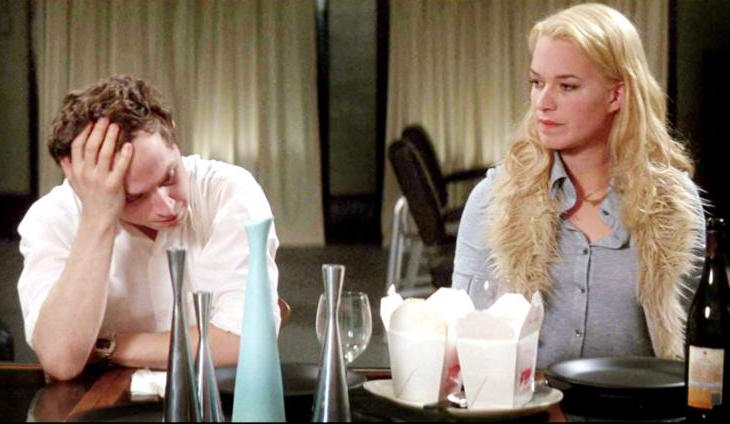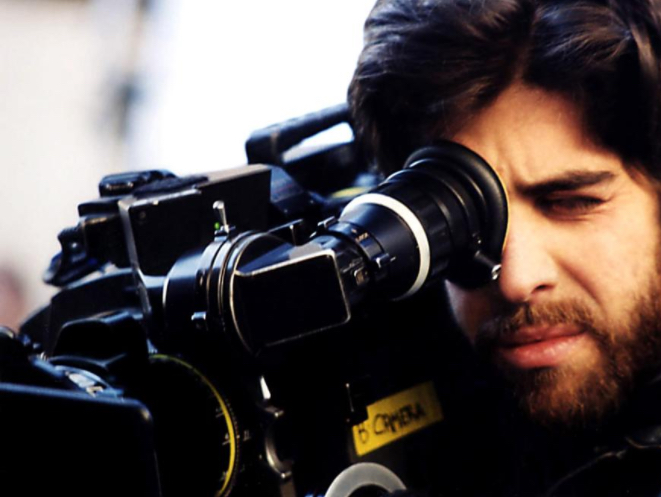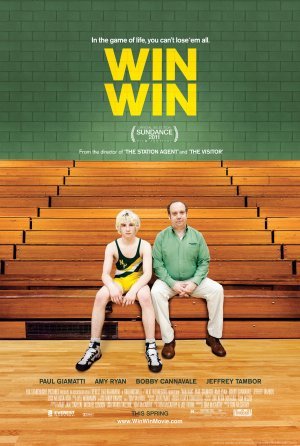As SAGindie celebrates our 20th Anniversary, we’ve opened our archives and unearthed some long-lost features and interviews from years past we thought were worth sharing again. Below is a re-post of one of our archived interviews.
[Originally published in SAGindie Spotlight, November 2005]
THE OBJECT OF HIS OBSESSION
An interview with I Love Your Work director Adam Goldberg
ADAM GOLDBERG is probably best known for his work an actor in mainstream features like Saving Private Ryan and A Beautiful Mind, but he is also an accomplished musician and an aspiring indie director. I LOVE YOUR WORK is his sophomore turn behind the camera. In this personal, expressionistic drama he enlisted the assistance of some of Hollywood’s best actors. Giovanni Ribisi plays an actor at the top of his game that becomes dangerously obsessed with his own fans, played by Joshua Jackson and Marisa Coughlan. With cameos from Vince Vaughn and Christina Ricci, there is never a dull moment in this off-color arthouse piece.
SAGINDIE: How did you become a filmmaker?
ADAM GOLDBERG: I have been making films since I was a teenager. I always wanted to make movies for a living, as well as act. Acting seemed to be a more accessible way of going about making a living. I always wanted to write what I direct but it took me until I was 24 to actually sit down and write something. That was a film called Scotch and Milk. I got a couple of guys together and we were determined to make it at any cost. And we made it for an obscenely small amount of money, mostly due to in-kind donations.
How did you come up with the idea for this project?
AG: Years ago I had this idea for a really generic sort of thriller about a movie star stalking a fan. It was the seed of the idea, and seemed kind of amusing. I didn’t really know what to do with that idea so I sat on it for a few years. Then it occurred to me it could embody several different kinds of elements and that could be the hook or the centerpiece that it would be built around. Really it would end up being about wanting something that you can’t have and that is a universal issue. The movie star wants his past, the purity that this young couple represents and they want to be where he is. They both dream of life on the other side of the fence.
If this story originated with you, how did you approach the collaborative process to reach your own vision?
AG: In this case I wrote the first 45 or so pages on my own so the tone was set. I got together with Adrian [Butchart] and we worked out the plot points. I really felt that I benefited from the collaboration because I think I’m good with tone, dialogue, and ideas, but he really helped me with settings and plot points, which would give it a slightly more conventional structure. He wrote a version that was a much more categorizable thriller and we went over it several times until we got it to the first real draft. Once that foundation was laid, I was able to bring in all of the unconventional pieces that I like.
And how about your working relationship with your Director of Photography?
AG: Mark Putnam is the DP that I used on both Scotch and Milk and this film. He’s kind of a sponge, I’ll show him lots of movies and say, This needs to be this and this needs to be that, and he is able to absorb it in a short amount of time. He takes all the information I throw out and somehow he manages to translate it. A lot of the films I show him aren’t films that he’s particularly familiar with and he’s able to take it in. This film had a very specific color theme. For instance, I knew I wanted one scene entirely red, and another scene yellow, and another scene green. He very successfully realized the images that were in my head. We spent a lot of time together, pouring over the script, before we even had money for the movie.
Where did the money come from?
AG: I would be bullshitting you if I told you I knew all of the machinations of how the movie got made. The chores were pretty evenly divided between myself and [producer] David Hillary. The two entities who ended up financing the film were a company called Cyan Pictures and Fireworks, which subsequently closed its Hollywood branch, and that’s why it took so long for the film to come out. If you look at the credits, there are a lot of them, and I think that alludes to certain bridge loans that David acquired along the way. I was very focused on getting the cast together and then we still had to work really good deals at Panavision and Fotokem because if we were to pay top dollar for high-end goods and services we would never be able to afford it.
Was there any formal casting for the film?
AG: Well, Giovanni was the first person I gave the script to because he and I have had a relationship for a long time and we both wanted to collaborate again. Some of the smaller roles were favors. Vince Vaughn and Judy Greer and Shalom Harlow and the rest. We offered the role to Christina Ricci and she said yes and the same with Franka [Potente], and the others came to the movie though meetings I had because I don’t like auditions. I don’t like to audition as an actor or a director. We had a casting director who we had meetings with and out of that we came up with Joshua Jackson and Marisa Coughlan. Jared Harris and I had met a couple of times and talked about doing something different.

Was it difficult to work around the actors’ busy schedules?
AG: It wasn’t so bad. For some reason it all kind of worked out pretty well, with the exception of one debacle that took place in the middle of the shoot, Franka had to go up to Canada for some immigration thing. So we had to revamp the schedule and shoot a huge amount of stuff in a short extremely brief period.
Was it difficult changing hats from actor to director?
AG: It’s difficult to figure out what direction I should pursue. If I were to totally pursue my directing career, I don’t know that I would be able to make a living, at least if I continue writing my own films. For me it’s such long process, which is one of the reasons I’ve started reading other people’s scripts to see if there is something I could feel enough connection to direct. In the meantime, I take the acting work as it comes.
You are primarily known as a comedic actor and yet the film is rather dark, why do you think that is?
AG: What one does as an actor is subject largely to what they are hired to do. I don’t have that much say in what I’m hired to do, where as I have all the say in the world as a writer and filmmaker. I would say this film captures who I am in a sense. If you look at like Lenny Bruce or something, he was a pretty dark fellow.
How close are you to the character Gray, which Giovanni Ribisi plays?
AG: I don’t consider myself to be a movie star; I’ve never been on the cover of People magazine. I was thinking the character was more on the lines of Russell Crowe, who I was working with when I wrote the script. I wanted to capture all of the unbelievable madness that was engulfing him. And how you could see this man being affected by that, and probably still is. He wasn’t my inspiration really, I was already writing the script, but more like a frame of reference for me. It was helpful to have when we would talk about it, or when Giovanni and I would talk about it. That he’s an actor is an easy well for me to draw from. I can paint a somewhat accurate picture, but really I am using it as a metaphor.
How involved were you with the music and sound design?
AG: Pretty heavily. I had a hand in most all of the music. There were a few composed pieces but most of the music was done with musicians that I work with and/or stuff that [composer] Steven [Drozd] ended up recording from demos I’d made, or I would come up with a base line and he would do all of the orchestrations. Music has always been a big part of my life but I’ve never done anything with it but make recordings for myself. As far as sound goes, I am completely obsessed with sound design. I love it. John Marquis designed the sound, and I would come in with a pedal or some weird sound and run it into his system and he would run it through mine. One thing would turn into the other, I like the idea of sound and music overlapping and melding.
Where did you shoot the film?
AG: It was meant to be an amalgam of New York and Los Angeles - a kind of dream city. I didn’t want the film to take place in a specific location because the lead character is neither here nor there. I was written initially to be shot in New York. I wanted all of these masses of people to be affecting his psyche in a detrimental way. But when we were ready to shoot it was winter in New York and it ended up being to expensive to film there. I shot my first film in downtown Los Angeles, and that has always been a part of the city that I really connect with, so we decided to shoot there.
The film has a large amount of characters and locations, was that difficult to manage on a small shoot?
AG: It’s definitely really tricky. It’s funny because I was always really bad at math, the numbers held very little interest to me. But when I write I find that I view things in a very logical, almost mathematical way. I love to peel the layers off of things and mixing them up but I’m always aware of how the puzzle pieces fit together. Part of that is taking tons of notes. I have notebooks filled with suggestions of how things should be composed.
How long was your shoot?
AG: We had 22 days to shoot this film, I bought us a 23rd and then we did a pick-up day when we were editing, just for some basic establishing shots. It was crazy. I will never do it that way again. You get to a point where you want to do a movie so badly; you are willing to enter into a Faustian deal, just like the lead character in the film. I can’t imagine how great it would be to have 30 days to shoot.
What suggestions would you have for other aspiring actor director types?
AG: For me the hardest part of making a film is shutting down the part of myself that doubts my ability to get something impossible done in a business that is really not all that magnanimous. It’s very hard for me to shut that part off and write something. So I would suggest that you find a way to shut that switch off. It’s kind of a dumb, basic behavioral advice, but you can’t write something until you sit down in a chair and forget about how impossible it is going to be. Another thing that I found helpful is to set a shooting date and that was the producer’s deadline to find the money. On this project we had to push the shoot three months, but in the scheme of things that wasn’t really all that much. Like the old cliché, act first and your feeling will follow.
I Love your Work is in limited theatrical release in Los Angeles and New York will soon be in an arthouse near you.
__
Thanks to Adam for discussing I LOVE YOUR WORK.
If you’re an independent filmmaker or know of an independent film-related topic we should write about, email blogadmin@sagindie.org for consideration.



